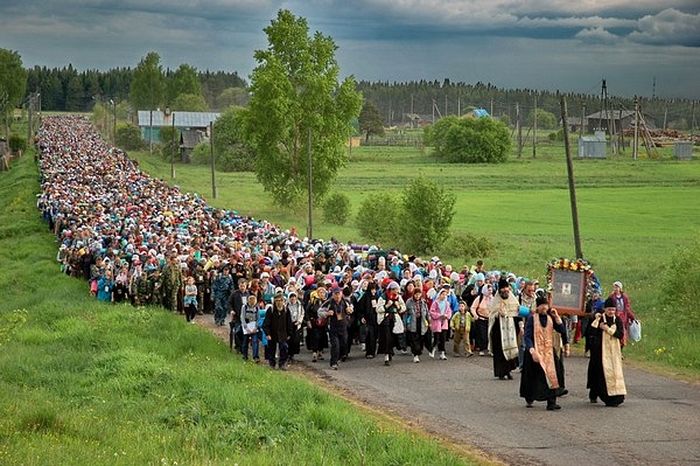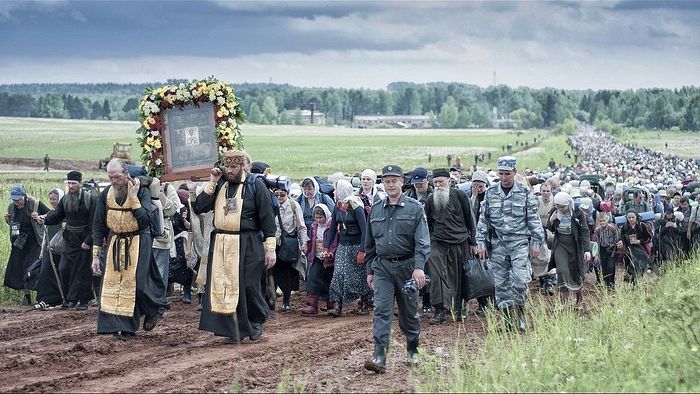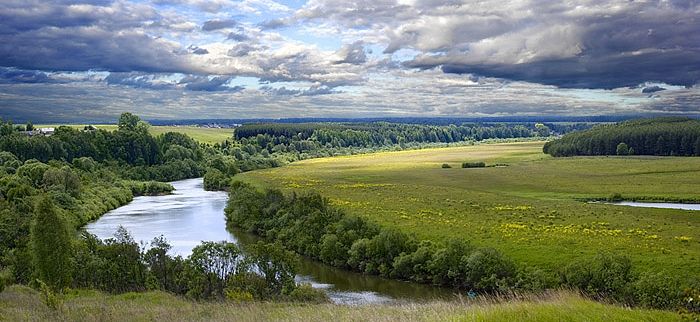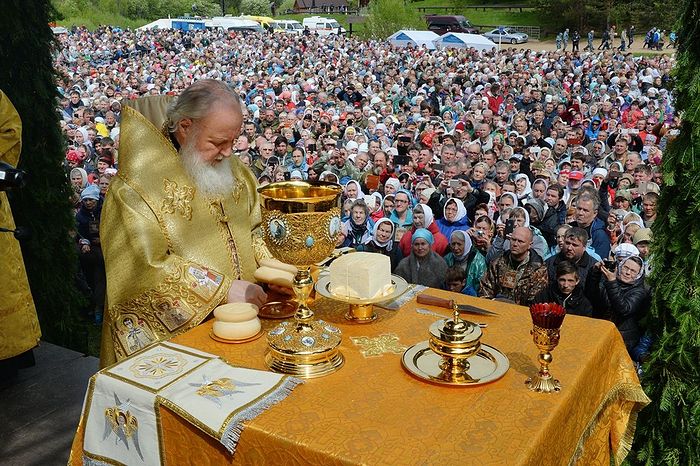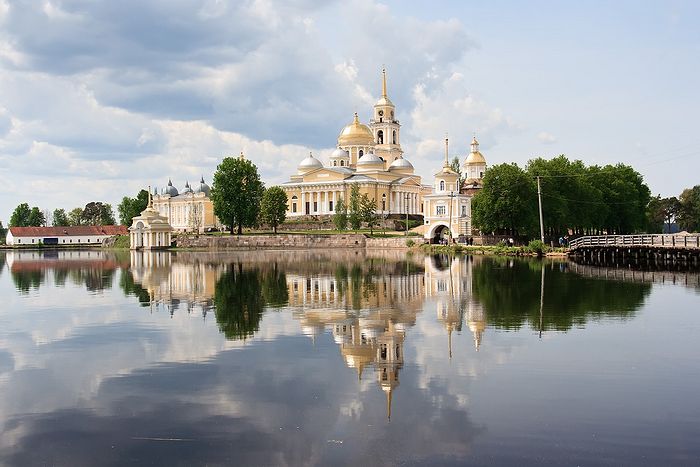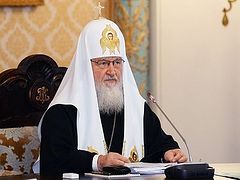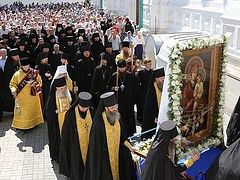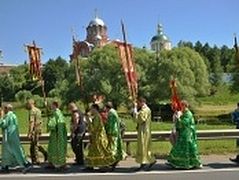A Cross procession is also a podvig.
The Velikoretsk Cross procession has required strength from each of us. Knowing of your podvig, some people compare themselves with you and ask, “Maybe we also could have done it?” Sometimes people ask me, “What do you think—could I have walked the procession with my children?” I always answer, “We can not only walk the procession, but we can also perform many other podvigs if we do them in the name of faith. The Cross procession is also a podvig. But contemporary man is educated as if no podvigs are necessary, that we need to live richly, to have and spend a lot of money, and enjoy life. In this false system of false values there is no place for podvig, and those who think this way not only never walk the Velikoretsk procession—they find it hard to even leave their homes.
Podvig is always a movement forward.
Your Cross procession is a testimony to our people’s living faith and their ability to perform a podvig in God’s name, and a podvig is always something that goes against our desires, our comfort and pleasure. Podvig is always a movement forward, a movement with great strength. And if we walk the Velikoretsk cross procession, not stinting our strength, then ever more so will we be able to walk our life’s cross procession, if it will also be inspired by the Orthodox faith and with the help of the holy God-pleasers. We should always preserve the Orthodox faith as the greatest treasure that unites our people, and as something without which Rus’ cannot exist. And no matter what anyone says to us, no matter with what condescension we are viewed by those who consider that they possess knowledge, might, earthly wealth and power, we will with humility carry our faith in our hearts and turn to the Lord with this faith, knowing that He hears our prayers.
From a homily given to the participants of the Velikoretsk Cross procession
June 6, 2017, the day of the commemoration of the
appearance of the Velikoretsk icon of St. Nicholas
Our people had inner strength
Wherever churches and monasteries appeared peoples’ lives where strengthened. That is how our country developed: first would come monks, then missionaries, preachers, Cossacks, settlements formed around monasteries and churches—and neither the northern climate nor dense forests could stop people from coming to settle. Our people had such inner strength that without maps or compasses, without automobiles, ships, or airplanes they assimilated a gigantic space from the Baltic Sea to the Pacific Ocean.
Today we are used to comfort, and modern means of transportation. We know without a doubt that when we leave our homes we can go anywhere we please. But back then, people walked toward the sun, without any roads at all, across rivers, swamps, and forests. What strength our forebears had, who moved forward without even knowing exactly where! Now we live on these wide spaces—we just flew from Velikoretsk to Viatka by helicopter and looked at the remarkable landscapes, the wondrous wide open spaces, forests, meadows, rivers… How wonderful it is that we live in such a beautiful country! And may God grant that every following generation might pay due respect to those who lived and created before us, making their contribution both spiritual and material to the prosperity of our Fatherland.
It is our duty to pass the Orthodox faith on to future generations
There is no need for us to be timid, we are in our Motherland, we live in an Orthodox country. It is our duty to pass on the Orthodox faith to future generations, to our children and grandchildren, so that they would continue to walk the paths that our remarkable spiritual pioneers walked and which we are walking today. I would like to wish that our clergy preserve the faith, their pastoral feeling, to always recognize their enormous responsibility before God, which we as pastors bear for the people entrusted to us. When we lived in difficult conditions, under the godless authorities, we were not allowed to go farther than our churches, and all our goals had to be set within the parish. But today the Lord can truly hold us accountable not only for our parishioners’ spiritual life, but also for the spiritual life of all our people, especially the young, for their faith and for their unbelief. What are we doing so that the people would return to Christ, so that churches would be filled, so that people would live in Christian marriages, raise their children, preserve purity of life, and pass it on to the future generations? After all, this is the clergy’s direct responsibility.
From a sermon given in the Dormition Church
of the Holy Dormition-St. Tryphon Monastery
Kirov, June 6, 2017
A podvizhnik is one who moves towards God
There is an amazing Russian word—podvig. The root of this word is the same as in the word, “dvizhenie”, which means “movement”. A podvizhnik is one who moves. Nevertheless, no one would call podvizhniks those who today travel around the planet using modern means of transportation. There is no podvig in this movement. What kind of movement do we mean with regard to those who remained their whole lives in one place, in solitude, lacking nourishment, or the support of other people? What podvig are we talking about?
We often say of people who are intensively, dynamically moving through life, “What a dynamic person!” This is not entirely correct, because “dynamic” means “strong”; but we apply this word to a laboring person, who is capable of actively going through life and achieving his goals. We say, “What a dynamic leader! What a dynamic person! He manages to accomplish so much! How quickly he goes through life, and how successfully!” But is there a difference in meaning between the older word, podvizhnik, from the word, “movement”, and the modern concept of a “dynamic person”? There is, and the answer to the question of this difference is of essential importance to each of us.
People call a person who moves toward the acquisition of life’s material goals a “dynamic person,” but he would hardly be called a podvizhnik. We are talking about podvig not when a person moves from one place to another, up a career ladder or from strength to strength, power to power. We do not speak of such people as a podvizhniks. We call people by this name who in their lives are moving toward God. And this doesn’t necessarily mean that they are moving in space—a person can live alone for decades on an island and yet be a podvizhnik, striving toward the highest goal of human existence. And if modern people, dynamic and purposeful, set other goals, then they are laboring in vain. For in God’s judgment these goals mean nothing. Whether a man achieves them or not is not important to God. For God, only the achievement of the goal toward which St. Nilus of Stolbensk and the hosts of true podvizhniks moved has significance, for they did not simply strive for the only right goal of existence—they achieved it.
Perhaps someone who hears these words might say, “So, are we to sit in solitude on islands, feeding on mushrooms, tree bark and nuts?” I am not calling anyone to this, because none of us are capable of living that way. I am not calling anyone to renounce the achievement of human goals, especially those who are gifted with specific abilities, including the ability to direct people. It would be sinful to renounce one’s vocation. But it is of great importance that the true goal of life not be obscured by ephemeral goals, conditioned by the framework of our limited earthly world! And if a person unites his dynamism and ability to achieve everyday goals with podvig, the ability to achieve the only God-pleasing goal, then we can say that we have before us a genius. People such as this are praised today by the Church, and even by those who are far from the Church.
I can cite examples of such people, and first of all perhaps St. Alexander Nevsky, who united the earthly goal of establishing our Fatherland’s life with the eternal goal of bringing our people closer to God and spiritually enlightening them. And today our prayer should be that contemporary people would not lose their orientation on the paths of their lives, that they would not lose their vision of true, eternal goals, so that dynamism in material, visible life would not deprive us of the possibility to be podvizhniks of spirit. Then we, uniting the divine with the human, the vertical with the horizontal, would have an immutable system of coordinates, and we might move along the only true life path toward eternal happiness, which the Almighty Creator of the world gives us through communion with Him.
From a homily after the Liturgy
in the Theophany Cathedral of the St. Nilus of Stolbensk Monastery
June 9, 2017, at the celebration of the 350th anniversary of the
uncovering of the relics of St. Nilus of Stolbensk

